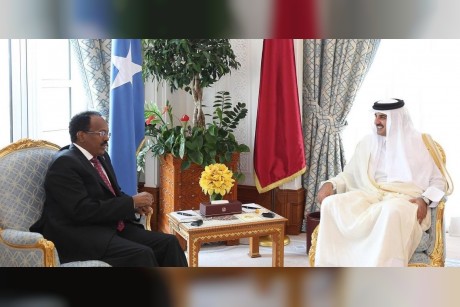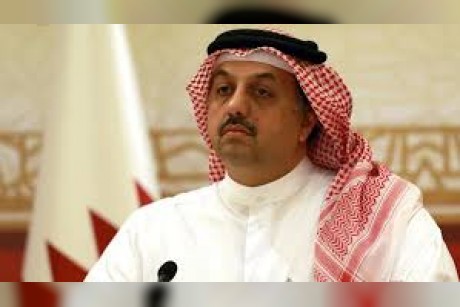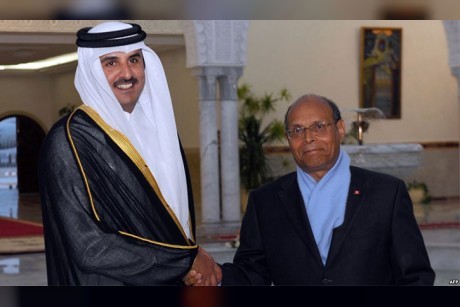Recalling the incident, when a small car bomb exploded outside a courthouse in the port city of Bosaso in northern Somalia, local news reports chalked it up to Islamist militants retaliating for American airstrikes. At least eight people were wounded, and a local affiliate of the Islamic State claimed responsibility.
It was concluded that the attack, however, may have also been part of a very different conflict: one among wealthy Persian Gulf monarchies competing for power and profits across the Horn of Africa.
War-torn Somalia has emerged as a central battleground over the last two years, with the United Arab Emirates and Qatar each providing weapons or military training to favored factions, exchanging allegations about bribing local officials, and competing for contracts to manage ports or exploit natural resources.
In an audio recording obtained by The New York Times of a cellphone call with the Qatari ambassador to Somalia, a businessman close to the emir of Qatar said that the militants had carried out the bombing in Bosaso to advance Qatar’s interests by driving out its rival, the United Arab Emirates.
Businessman, Khalifa Kayed al-Muhanadi, said in the call on May 18, about a week after the bombing“The bombings and killings, we know who are behind them”.
The violence was “intended to make Dubai people run away from there,” he said, referring to the Emirates’ financial capital. “Let them kick out the Emiratis, so they don’t renew the contracts with them and I will bring the contract here to Doha,” the capital of Qatar.
If accurate, his claims are striking new evidence of the potential for the competition among Persian Gulf states to inflame strife across the Horn of Africa.
“Somalia is the most vivid example of the potential destabilization brought by the Gulf rivalry,” said Zach Vertin, a scholar at the Brookings Institution and a former American diplomat in the region. “The Gulf sees these states as clients. It is all about controlling the space: plant a flag in the ground and lock down territory and relationships before your rival can.”
The scramble for power in Somalia and the Horn of Africa is in some ways an extension of the cold war that has flared across the region since the beginning of the Arab Spring uprisings more than eight years ago. Qatar and Turkey backed the uprisings and the Islamist political parties that rose with them. The United Arab Emirates and Saudi Arabia opposed the uprisings and the Islamist parties, and accused Qatar of backing militants.
Two years ago, the United Arab Emirates, Saudi Arabia, Egypt and other allied states cut off commercial and diplomatic ties with Qatar in an effort to pressure it to alter its policies.
Somalia is an impoverished country, but its long coastline offers access to the region’s fast-growing markets and influence over vital shipping lanes from the Persian Gulf. An Emirati company manages the port in Bosaso.
Asked about the cellphone conversation, neither Mr. al-Muhanadi nor the government of Qatar disputed the authenticity of the recording, but both said that he was speaking as a private citizen and was not a government official.
“The state of Qatar’s foreign policy has always been one of creating stability and prosperity — we do not meddle in the internal affairs of sovereign countries,” the Qatar communications office said in a statement to The Times. “Anybody doing so is not acting on behalf of our government.”
However in the recording of the phone call, which was made by a foreign intelligence agency opposed to Qatar’s foreign policies, the ambassador expressed no protest or displeasure at the idea that Qataris had played a role in the bombings.
“So that’s why they are having attacks there, to make them run away,” the ambassador, Hassan bin Hamza Hashem, replied.
“Our friends were behind the last bombings,” Mr. al-Muhanadi, the businessman, assured the ambassador.
Mr. al-Muhanadi is known to be close to the emir, Qatar’s ruler, Sheikh Tamim bin Hamad al-Thani. There are photographs of the two of them together and, according to news reports and text messages provided by the intelligence agency, Mr. al-Muhanadi frequently travels with the emir.
In a brief telephone interview with The New York Times, the ambassador denied knowing Mr. al-Muhanadi and quickly hung up.
In a separate telephone interview, Mr. al-Muhanadi said that he was only a “school friend” of the ambassador’s. “I am a retired man and a trader,” he said. “I do not represent any government.”
Asked why he had described the Bosaso attackers as “friends,” Mr. al-Muhanadi said, “All Somalis are my friends.”
If the Bosaso bombing was intended to drive away the Emiratis, it was not the first attack there directed at them.
In February, two assailants disguised as fishermen shot and killed the manager for an Emirati company involved in running the port. The company, P&O Ports, said that three other employees were wounded.



